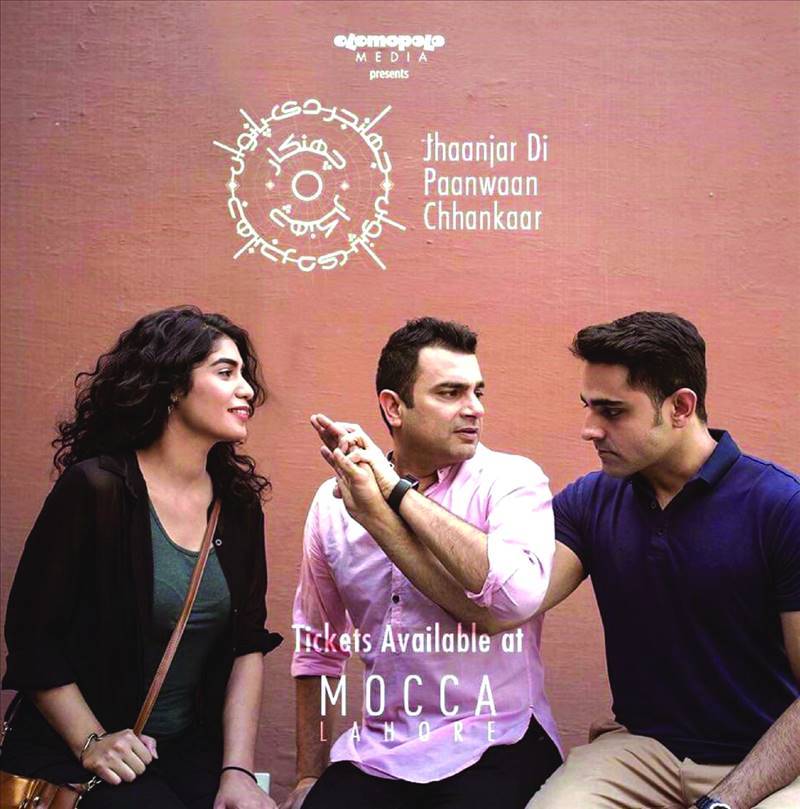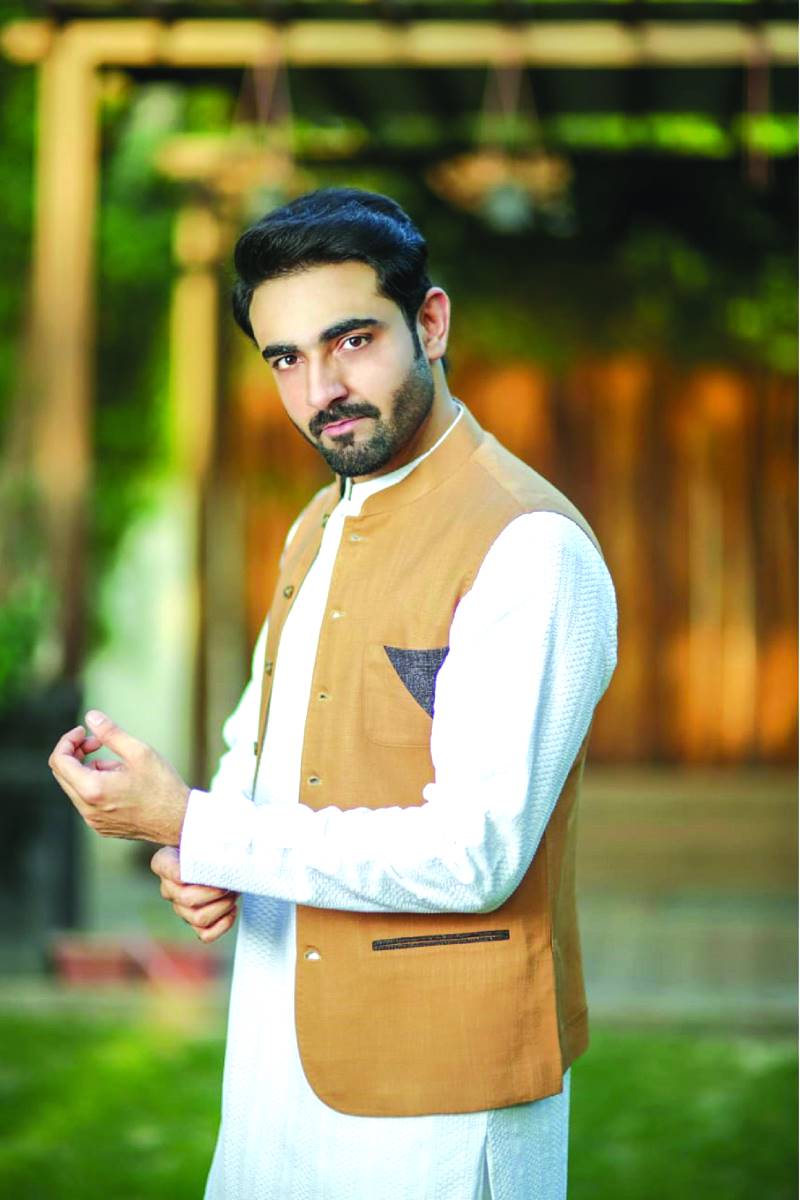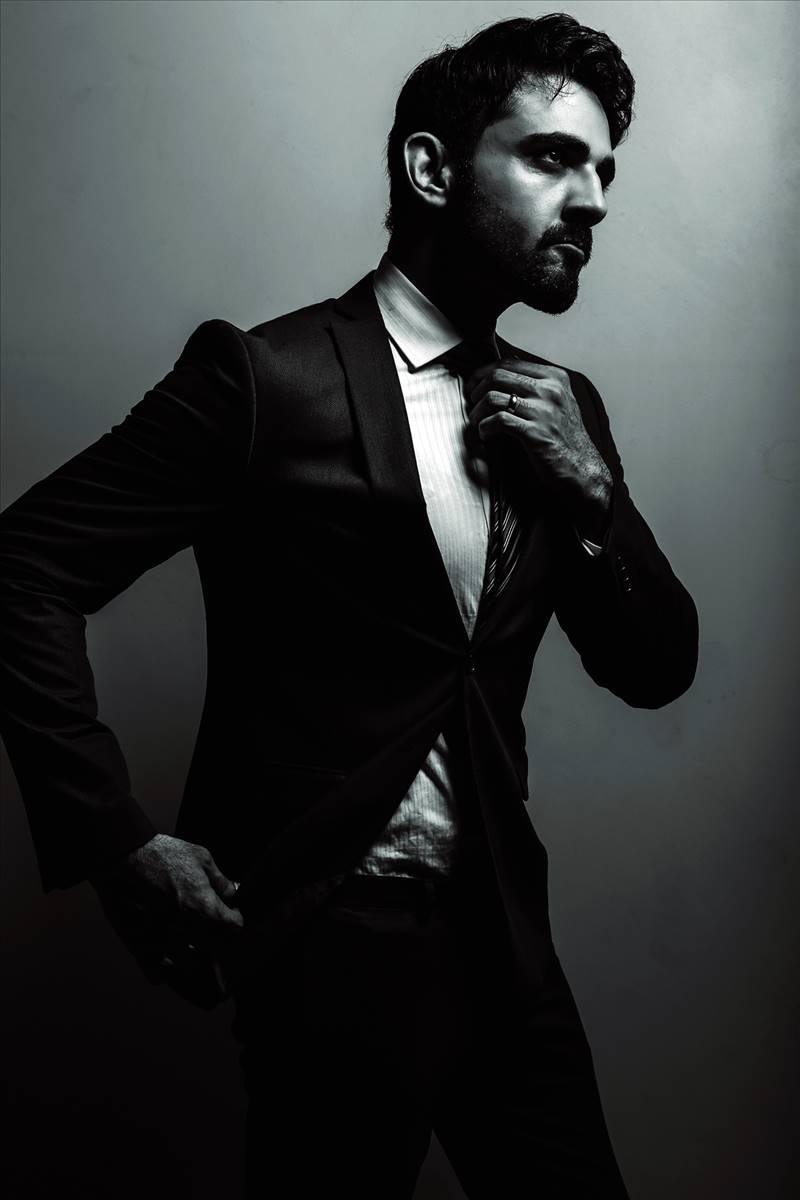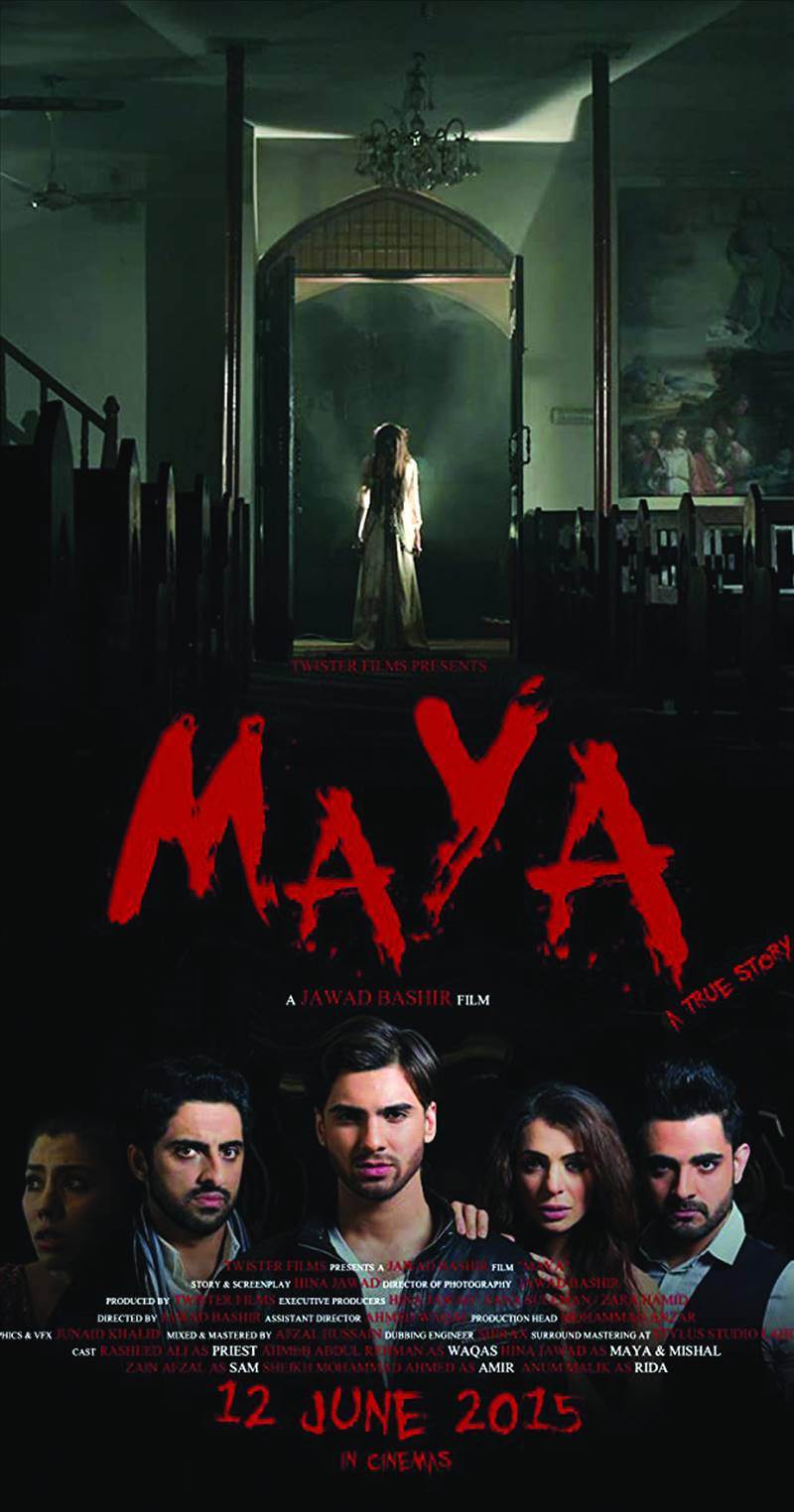
Zain Afzal may well be one of the freshest sensations in our showbiz industry. He procured a degree in Film, Theatre and Television from Beaconhouse National University in Lahore. Having done that, he auditioned for Jawad Bashir’s horror flick, Maya and got selected, after which there was no looking back for the actor. He continued to perform under the direction of veterans like Sarmad Khoosat, Kanwal Khoosat and Aamir Yousaf for theatre, television and cinema – his notable works being the play Jhanjar Di Paawan Chankaar, the film Ready Steady No and the serials Saanwari, Jaan Nisar and Chakkar, the latter-most shot at the heart of Lahore along-with greats like Irfan Khoosat and Faryal Gauhar; a rarity in modern times. The Friday Times caught up with Zain Afzal to ask him some questions about his experience.
Muhammad Ali: One of your upcoming projects includes a horror web-series. Tell us something about it. Besides, how did you accept the offer while it is known that horror is not something you liked greatly?
Zain Afzal: The web-series is called Aprita, starring myself, Sarwat Gilani and Yasra Rizvi. It has been produced by Nashpati Prime and will soon be aired on Jazz Daikho web portal. As far as the genre is concerned, it’s true that I don’t watch horror of any sort. My first question when I was offered the series was “Mere sath tou kuch bura nahi hone wala na?” (“Are you sure I won’t be encountering any spooky experiences in real?”) Then when I read the script thoroughly, I loved the plot and agreed to do it. It’s essentially based on true events and incorporates all the sub-genres of horror such as mystery, suspense and thrill.

M.A.: In Pakistan, scary stuff usually gets associated with religious beliefs. Does this series tackle its horror story from a religious lens in order to satisfy local interests or does it deal with it psychologically for a world-wide audience?
Z.A.: It does incorporate the religious element. Sarwat and I have been shown as forming a contemporary, modern couple, but considering the society the characters belong to, the element of religion definitely enters the story when things take unexpected turns.
M.A.: You have worked for theatre, television and cinema in the past, and are now moving towards web-series. Which of these mediums do you enjoy the most and find exciting?
Z.A.: I enjoy theatre the most! Extensive hard work in the form of rehearsals goes into the making of a theatre play. Secondly, it is during your very performance that you get to attain the result of your effort. If you have the audience sitting before you, hooked to your performance, you experience one of the best feelings in the world. But yes, I am always up for challenges, the kind that on-screen media such as film and television bring with them. As far as excitement is concerned, the level remains the same for an enthusiast like me. At the end of the day, it all comes down to the script and the director – and their collective ability to keep you engaged in the work.
M.A.: Your theatre play “Jhanjar Di Pawaan Chankaar” is now available on Zee5 for the Indian audience as well. Which aspect of the play do you think gives it its universal appeal?
Z.A.: Jhanjar Di Pawaan Chankaar is basically an adaptation of an American play from the 1940s. The credit goes to the writers and directors including Sarmad Khoosat for adapting it so well for a South Asian audience that it gained appreciation on both sides of the border. It’s a coming-of-age story of a blind boy whose mother’s over-protective disposition makes it difficult for him to have exposure to the world outside. That a young boy wishes to pursue his dreams and wants to live his life on his own terms but is being kept from doing so by a smothering parent is what attracted viewers towards it.

M.A.: You seem to be more inclined towards comedy. Are there any celebrities who have acted as inspirations for you in the field of comedy?
Z.A.: I usually go for comic roles not because I am inclined towards comedy, but because I am interested in taking up the challenges which come with it. I am more into probing myself as a performer to see what I am able to do – and to what extent. It is probably a reason why I have tried genres other than comedy as well, such as romance, horror and even action thrillers.
M.A.: You have studied filmmaking and you have also performed in Pakistani films such as Maya, Zinda Bhaag and Ready Steady No. As someone who has gone through the medium academically, where do you think our film industry stands?
Z.A.: For quite a while, we have been saying that our film industry is going through a revival. I believe that it is high time we started taking constructive criticism as a positive aid in making us realize why our audience is not attracted to our films and instead prefers Hollywood material or Netflix-based South Asian content. No one from the field of Liberal Arts – including writers, directors and actors – should think that they have achieved everything that they possibly could. If you place a full-stop after something good that you do, you stop yourself from staying updated and evolving.

M.A.: What has been your major struggle as an actor and which project do you think provided your breakthrough?
Z.A.: The initial struggle was to land good acting gigs. Later on, the struggle turned into one of delivering the right performance. Now, the struggle remains to keep performing up-to the mark. I believe that my breakthrough, apart from Jhanjar Di Paawan Chankaar, was Saanwari – a HUM TV serial for which I went to Karachi for the first time for professional work.
M.A.: You recently did a film for a festival. Which festival was it and what was the film about? Was it too, like other films for festivals, off-beat and unique?
Z.A.: Shot in Turkey, it was a very novel love-story with undelying messaging about society’s stereotypes. It was written and directed by a young, upcoming director from NCA.
M.A.: Do you believe that your education in the field of film and television has given you any extra advantage as an actor?
Z.A.: I would say that it gave me a better perspective on how to develop the dynamics of it all – keeping the story-line in mind. Plus, it also gave me immense confidence as a performer.
M.A.: Name one writer and one director with whom you wish to work but haven’t been given the opportunity until now.
Z.A.: The writer would be Syed Mohammed Ahmed and the director would be Kashif Nisar. These two people are masters of what they do, especially when it comes to bringing emotions on to the screen.
M.A.: For someone who is educated and discerning, does it become difficult accepting scripts with titles like Resham Gali Ki Husna? Do you feel a little hesitant?
Z.A.: I believe that a title is something that should be catchy and describe the crux of the plot all the same. It’s true that they can be a bit in-the-face at times, but there have been some really good titles as well.
M.A.: Since you have studied film-making and know the art of telling televised stories, what kind of a story would you tell if given a chance to direct a serial?
Z.A.: If I direct a serial in the future, it will most definitely be something very contemporary and issue-based. There’s a vacuum that exists in this genre in our drama industry and I wish to fill it by bringing currently existing issues to television in a creative way.
M.A.: What are your upcoming projects other than the web-series? Which of the two mediums from television and web do you think is better for story-telling?
Z.A.: I have two projects in pipeline for HUM TV, one of them being “Bad-zaat” shot in Karachi, and the other being Qurbatein shot in Islamabad. The story-telling completely depends on the story and the script. I do believe that the web has a little more advantage over television as there are lesser restrictions. However, it again becomes difficult to decide between the two if you keep under consideration some excellent television projects aired recently. What the audience wants right now is a good story, and the bar has significantly been raised by the content available on foreign web portals.
M.A.: Have you ever come across negative criticism? If so, what is your way of dealing with it?
Z.A.: While I have mostly been supported by my friends and family members, I would rather term the sprinkling of criticism from them as “constructive criticism”. I listen to them attentively when they give me an advice or ask me to tweak a few things in my performance. I ask my friends and colleagues myself if they are satisfied with my work or not, including my wife, who also happens to be a media student, and take care to apply those suggestions to my work. I believe that the audience is the end-user when it comes to Performing Arts. Their opinion does matter and one has to cater to their demands and handle the character in a way that they appreciate.
Muhammad Ali is an M.Phil scholar and a former visiting lecturer at GCU, Lahore. His interest lies in indigenous literature, the specific research areas being Partition novel, Environmental Literature emerging from South Asia and classical and contemporary Pakistani television drama. His research on Sahira Kazmi’s “Zaib un Nisa” which was a part of his graduation thesis has been presented on various platforms including Olomopolo Media. This interview is a part of a series of interviews in which various Pakistani celebrities including writers, actors and directors will be asked questions regarding their professional work. The writer can be reached at m.ali_aquarius85@yahoo.com
***
Muhammad Ali: One of your upcoming projects includes a horror web-series. Tell us something about it. Besides, how did you accept the offer while it is known that horror is not something you liked greatly?
Zain Afzal: The web-series is called Aprita, starring myself, Sarwat Gilani and Yasra Rizvi. It has been produced by Nashpati Prime and will soon be aired on Jazz Daikho web portal. As far as the genre is concerned, it’s true that I don’t watch horror of any sort. My first question when I was offered the series was “Mere sath tou kuch bura nahi hone wala na?” (“Are you sure I won’t be encountering any spooky experiences in real?”) Then when I read the script thoroughly, I loved the plot and agreed to do it. It’s essentially based on true events and incorporates all the sub-genres of horror such as mystery, suspense and thrill.

M.A.: In Pakistan, scary stuff usually gets associated with religious beliefs. Does this series tackle its horror story from a religious lens in order to satisfy local interests or does it deal with it psychologically for a world-wide audience?
Z.A.: It does incorporate the religious element. Sarwat and I have been shown as forming a contemporary, modern couple, but considering the society the characters belong to, the element of religion definitely enters the story when things take unexpected turns.
“At the end of the day, it all comes down to the script and the director – and their collective ability to keep you engaged in the work”
M.A.: You have worked for theatre, television and cinema in the past, and are now moving towards web-series. Which of these mediums do you enjoy the most and find exciting?
Z.A.: I enjoy theatre the most! Extensive hard work in the form of rehearsals goes into the making of a theatre play. Secondly, it is during your very performance that you get to attain the result of your effort. If you have the audience sitting before you, hooked to your performance, you experience one of the best feelings in the world. But yes, I am always up for challenges, the kind that on-screen media such as film and television bring with them. As far as excitement is concerned, the level remains the same for an enthusiast like me. At the end of the day, it all comes down to the script and the director – and their collective ability to keep you engaged in the work.
M.A.: Your theatre play “Jhanjar Di Pawaan Chankaar” is now available on Zee5 for the Indian audience as well. Which aspect of the play do you think gives it its universal appeal?
Z.A.: Jhanjar Di Pawaan Chankaar is basically an adaptation of an American play from the 1940s. The credit goes to the writers and directors including Sarmad Khoosat for adapting it so well for a South Asian audience that it gained appreciation on both sides of the border. It’s a coming-of-age story of a blind boy whose mother’s over-protective disposition makes it difficult for him to have exposure to the world outside. That a young boy wishes to pursue his dreams and wants to live his life on his own terms but is being kept from doing so by a smothering parent is what attracted viewers towards it.

M.A.: You seem to be more inclined towards comedy. Are there any celebrities who have acted as inspirations for you in the field of comedy?
Z.A.: I usually go for comic roles not because I am inclined towards comedy, but because I am interested in taking up the challenges which come with it. I am more into probing myself as a performer to see what I am able to do – and to what extent. It is probably a reason why I have tried genres other than comedy as well, such as romance, horror and even action thrillers.
M.A.: You have studied filmmaking and you have also performed in Pakistani films such as Maya, Zinda Bhaag and Ready Steady No. As someone who has gone through the medium academically, where do you think our film industry stands?
Z.A.: For quite a while, we have been saying that our film industry is going through a revival. I believe that it is high time we started taking constructive criticism as a positive aid in making us realize why our audience is not attracted to our films and instead prefers Hollywood material or Netflix-based South Asian content. No one from the field of Liberal Arts – including writers, directors and actors – should think that they have achieved everything that they possibly could. If you place a full-stop after something good that you do, you stop yourself from staying updated and evolving.

M.A.: What has been your major struggle as an actor and which project do you think provided your breakthrough?
Z.A.: The initial struggle was to land good acting gigs. Later on, the struggle turned into one of delivering the right performance. Now, the struggle remains to keep performing up-to the mark. I believe that my breakthrough, apart from Jhanjar Di Paawan Chankaar, was Saanwari – a HUM TV serial for which I went to Karachi for the first time for professional work.
M.A.: You recently did a film for a festival. Which festival was it and what was the film about? Was it too, like other films for festivals, off-beat and unique?
Z.A.: Shot in Turkey, it was a very novel love-story with undelying messaging about society’s stereotypes. It was written and directed by a young, upcoming director from NCA.
“I do believe that the web has a little more advantage over television as there are lesser restrictions”
M.A.: Do you believe that your education in the field of film and television has given you any extra advantage as an actor?
Z.A.: I would say that it gave me a better perspective on how to develop the dynamics of it all – keeping the story-line in mind. Plus, it also gave me immense confidence as a performer.
M.A.: Name one writer and one director with whom you wish to work but haven’t been given the opportunity until now.
Z.A.: The writer would be Syed Mohammed Ahmed and the director would be Kashif Nisar. These two people are masters of what they do, especially when it comes to bringing emotions on to the screen.
M.A.: For someone who is educated and discerning, does it become difficult accepting scripts with titles like Resham Gali Ki Husna? Do you feel a little hesitant?
Z.A.: I believe that a title is something that should be catchy and describe the crux of the plot all the same. It’s true that they can be a bit in-the-face at times, but there have been some really good titles as well.
M.A.: Since you have studied film-making and know the art of telling televised stories, what kind of a story would you tell if given a chance to direct a serial?
Z.A.: If I direct a serial in the future, it will most definitely be something very contemporary and issue-based. There’s a vacuum that exists in this genre in our drama industry and I wish to fill it by bringing currently existing issues to television in a creative way.
M.A.: What are your upcoming projects other than the web-series? Which of the two mediums from television and web do you think is better for story-telling?
Z.A.: I have two projects in pipeline for HUM TV, one of them being “Bad-zaat” shot in Karachi, and the other being Qurbatein shot in Islamabad. The story-telling completely depends on the story and the script. I do believe that the web has a little more advantage over television as there are lesser restrictions. However, it again becomes difficult to decide between the two if you keep under consideration some excellent television projects aired recently. What the audience wants right now is a good story, and the bar has significantly been raised by the content available on foreign web portals.
M.A.: Have you ever come across negative criticism? If so, what is your way of dealing with it?
Z.A.: While I have mostly been supported by my friends and family members, I would rather term the sprinkling of criticism from them as “constructive criticism”. I listen to them attentively when they give me an advice or ask me to tweak a few things in my performance. I ask my friends and colleagues myself if they are satisfied with my work or not, including my wife, who also happens to be a media student, and take care to apply those suggestions to my work. I believe that the audience is the end-user when it comes to Performing Arts. Their opinion does matter and one has to cater to their demands and handle the character in a way that they appreciate.
Muhammad Ali is an M.Phil scholar and a former visiting lecturer at GCU, Lahore. His interest lies in indigenous literature, the specific research areas being Partition novel, Environmental Literature emerging from South Asia and classical and contemporary Pakistani television drama. His research on Sahira Kazmi’s “Zaib un Nisa” which was a part of his graduation thesis has been presented on various platforms including Olomopolo Media. This interview is a part of a series of interviews in which various Pakistani celebrities including writers, actors and directors will be asked questions regarding their professional work. The writer can be reached at m.ali_aquarius85@yahoo.com

